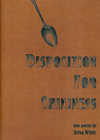A Disposition for Shininess
In Arisa White’s debut collection, A Disposition for Shininess, family eclipses mere flesh and blood. Siblings are a unit that both torture and uplift one another, come what may in the strange universe of adults. White’s observations of family dynamics gain interpretive momentum as the reader progresses through this slim volume of nine poems.
In Arisa White’s debut collection, A Disposition for Shininess, family eclipses mere flesh and blood. Siblings are a unit that both torture and uplift one another, come what may in the strange universe of adults. White’s observations of family dynamics gain interpretive momentum as the reader progresses through this slim volume of nine poems.
The six-part title poem contains a narrative embedded in imagery that works to inform the collection as a whole. Siblings dwell within the realm of a mother whose boyfriend redefines their cohesion as a family unit:
He rarely greets us –
what’s the point of saying hello over again?
He stays more nights, his clothes find a place
in her closets. This is the beast
crawling down the stalk:
Our doors are not locked to it,
morning or night it has welcome.
No choice to pretend we are not home
White probes the problem of what can children do to compete with a new adult figure, suddenly present, who gradually leverages a mother’s affection away from her children. She asks, “Who are we to rid her of her glass slippers, / Huxtability and thereafter?”
The poems unfold to reveal layers of family dynamics, most of which are bound up in the lives of siblings. In “To You, Named the Messenger of God,” the cohesion of sibs is revealed in full flower. The seven children are born with their own set of difficulties to weather and endure; but under White’s pen, each child eclipses those troubles backed by the love of family:
Nigel arrived on the 12th toll of golden bells, and you, Uriah
ride a love inexhaustible, inducible as Jah or art; we her seven wonders or sins.
. . .
We
jambeau
against collisions come low. Uriah, you are protected in Ibert’s
prayers, in Jamar’s, Shaquana’s eyes your beauty’s given back. You brown in Nigel’s sun-soaked scales and you string a psalm from Kayana’s water-vowels.
An endearing love is revealed that makes up for its lack from parental figures; where a mother’s love has grown chilly and distant (“For each year the wish for her to love me is broken / and the cast is old and soiled around my chest”) a philia takes its place. Children look out for one another, become each other’s greatest friends and allies.
White’s gift for pushing lyricism toward meaning unfolds throughout the collection; form informs content, whether through triplets or free verse, and the often striking observations give this poet a unique flavor all her own. Some lines stick and ramble around in the reader’s mind persistently (“our customs to the dust we pirouette down”) and often speak to transition, its proper care and handling. White’s petite debut collection leaves the reader wanting more from this promising poet, and waiting for her next collection.





